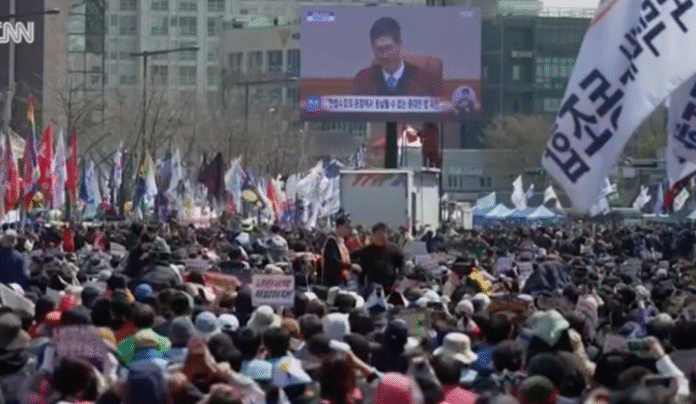By Jessica Park
South Korea’s president has been removed from office after the Constitutional Court voted unanimously to uphold his impeachment on April 4, 2025. Yoon Suk Yeol was suspended from duty in December after being impeached by parliament, following his failed attempt to impose martial law on December 3, 2024.
The decision was met with tears of joy and sadness among Yoon’s critics and supporters, who had gathered in various parts of Seoul to watch the verdict live. It’s a remarkable fall from grace for the former prosecutor-turned-politician, who rose to prominence for his role in the impeachment and imprisonment of another president years ago – only to now meet the same fate.
Friday’s unanimous ruling, delivered by the Constitutional Court’s eight justices, described the president’s actions as a “grave betrayal of the people’s trust.” The court’s acting head judge, Moon Hyung-bae shown in the photo above, pointed to the chaotic night of December 3, when the president sent troops to parliament and ordered soldiers to “drag out” lawmakers, noting that such actions “cannot be justified.” There was no national emergency, said Moon, and such a decree was simply unconstitutional. A special presidential election to replace Yoon must be held by June 3 in accordance with South Korea’s constitutional mandate.
What next for South Korea?
After months of anxiously waiting, South Koreans have some badly needed closure. The country can now start to heal and move forward, the first step being to elect a new leader.
But the political crisis caused by Yoon’s actions is still unfolding. Although his military takeover lasted only six hours, the political fallout has intensified since. It also reawakened the painful memories of the country’s violent, dictatorial past and reminded people that martial law was not consigned to history. Many are still upset by what happened that night, and afraid that the threat of martial law could happen again. For now, it is a victory for South Korea’s democracy, which for a while looked as if it was on dangerous ground.
The acting head judge Moon Hyung-bae said Yoon’s implementation of martial law was not justified, describing it as “against the people he was supposed to protect” that “damaged people’s basic political rights” and “violated the principles of the rule of law and democracy”. Since the verdict, there have been growing calls to change South Korea’s constitution – to strengthen its institutions and limit the powers of the president – to guard against this happening again. However, such reforms would require a future president willing to reduce their own authority.
As Yoon left office, he left behind not just a shaken country, but a divided one. But Yoon showed no remorse and continues to dangle the same unsubstantiated conspiracy theories that he used to justify his actions. He claimed that the country and his political opposition had been infiltrated by North Korean and Chinese spies, and that these “anti-state forces” had rigged past elections. His conspiracy theories have firmly taken root, and far-right extremism is flourishing. More than a third of people now say they do not trust the Constitutional Court which delivered Yoon’s verdict; more than a quarter do not trust the voting system.
Within this climate of distrust, South Korea must prepare for a new presidential election. A successor needs to be chosen in the next 60 days. These days are sure to be tense and even more divisive, and some may not accept the result that comes. Yet, South Korea urgently needs a new leader who can advocate for the country as a whole and represent South Korea’s interests on the global level. One of the first challenges will be dealing with the U.S. President Donald Trump. South Korea is already at a disadvantage as Trump’s 25% tariffs on cars and steel have hurt South Korea’s economy. According to a CNN report, many Koreans believe worse is coming, with Trump who will soon turn his focus to South Korea, demanding to pay more for its defence and seeking deals with North Korean leader, Kim Jong Un.

